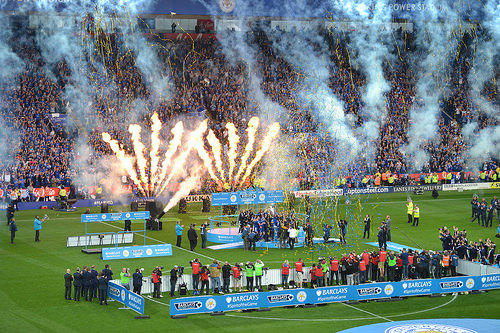Chips O’Toole
With the Western Bulldogs claiming their first VFL/AFL flag in 62 years and the Cronulla Sharks taking the first premiership of their 49 years in top-grade rugby league, the 2016 Grand Final weekend was one of fairytale finishes.
It was perhaps inevitable, then, that comparisons would be made with this year’s ultimate sporting Cinderella story, Leicester City’s incredible triumph in the Barclay’s Premier League.
Such comparisons, though, are completely unfounded, failing to recognise the vast structural differences between Australian and British football and selling the Foxes’ achievement a long way short.
Somewhat ironically given the rampant socialist tendencies of European governments, European soccer stands as a bastion of laissez-faire capitalism. While UEFA’s Financial Fair Play regulations have prevented them from spending beyond their means in recent years, clubs remain otherwise free to do with their money as they see fit in order to secure or retain the best available playing and coaching talent.
Those that are unable to keep pace in this cutthroat world are forced to suffer the ignominy – not to mention financial consequences – of relegation to the lower ranks, but the flipside is that lower-grade clubs have the opportunity to gain promotion, forming the basis of perhaps the most romantic notion in world sport: that any lowly community club can rise through the ranks to one day become national champion.
 Of course, the likelihood of such a club challenging the might of powerhouses like Chelsea, Arsenal and Manchesters City and United remains infinitesimally small, but this only serves to make Leicester’s story all the more compelling. That the club entered the 2015/16 season having barely avoided relegation from the Premier League the previous year is remarkable enough; when you consider that fourth-placed Manchester City boasted an estimated six players who commanded a higher wage than Leicester’s entire starting line-up, it becomes truly staggering.
Of course, the likelihood of such a club challenging the might of powerhouses like Chelsea, Arsenal and Manchesters City and United remains infinitesimally small, but this only serves to make Leicester’s story all the more compelling. That the club entered the 2015/16 season having barely avoided relegation from the Premier League the previous year is remarkable enough; when you consider that fourth-placed Manchester City boasted an estimated six players who commanded a higher wage than Leicester’s entire starting line-up, it becomes truly staggering.
Compare this to the state of the NRL and the “unapologetically socialist” AFL. While both the Sharks and the Bulldogs have earned reputations as battlers on the back of periods of financial turmoil, a quick look at recent history suggests the equalisation methods adopted by both leagues have gone a long way to ensuring the competitiveness of their less well-to-do clubs.
The introduction of the NSWRL salary cap in 1990 has seen Cronulla play finals in 14 of the 27 seasons since for seven top-four finishes, while the Bulldogs have played in 14 finals series from 32 seasons for eight top-four finishes since the then VFL introduced its cap in 1985 – an initiative that has since been followed by the many incarnations of the national draft, the Annual Special Distribution, the football department cap and a host of other equalisation measures.
None of this is to say we need be cynical of the Bulldogs’ and the Sharks’ joint success. At the end of the day, the players still had to get the job done, and 62 years – or even 49 years – is a long time for any supporter to wait to taste the ultimate glory.
But we shouldn’t delude ourselves into believing these premierships are more than they really are. They are not the result of two battling clubs defying all odds to overcome a system stacked heavily against them. They are examples of the system playing itself out exactly as it is supposed to.
The same cannot be said in the case of Leicester City, a club that had never previously won a top-flight title in its 132-year history and which just seven years ago found itself sitting in the third tier of England’s league system.
In winning the Premier League, the Foxes produced perhaps the greatest upset in the history of professional team sport, a genuine David-over-Goliath triumph the likes of which we may never witness again. Such a story bears no comparison and deserves to stand all on its own.
Chips O’Toole: Australia’s favourite son and a real dirty, rotten scoundrel.
Photo by boloveselvis 










